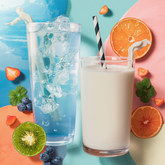In recent years, there's been a significant shift in the dietary habits of men around the world. The traditional image of a man at the grill, flipping steaks and devouring burgers, is gradually being replaced by men who are enthusiastic about seitan, tofu, and quinoa. This change isn't just a fleeting trend; it's a reflection of a broader movement towards health, sustainability, and ethical living. In this blog, we'll explore why more men are choosing veganism, debunk some common myths, and delve into the benefits of plant-based diets, including the rising popularity of plant-based milks.
The number of men adopting vegan diets has been steadily increasing. According to a 2020 study by the GlobalData Consumer Survey, there was a 600% increase in people identifying as vegans in the U.S. between 2014 and 2017, and a notable portion of this demographic shift includes men. This shift can be attributed to several factors:
Health Benefits: Research has consistently shown that plant-based diets can lead to significant health improvements. A study published in the American Journal of Clinical Nutrition found that vegans generally have lower body mass indices (BMIs), reduced risk of heart disease, lower blood pressure, and lower cholesterol levels compared to their omnivorous counterparts.
Athletic Performance: Many male athletes are turning to veganism to enhance their performance. Notable figures such as tennis champion Novak Djokovic and ultramarathoner Scott Jurek have adopted plant-based diets. A study in the Journal of the International Society of Sports Nutrition highlights that a well-planned vegan diet can support athletic performance by providing sufficient protein and nutrients for muscle repair and energy.
Environmental Concerns: Men are increasingly aware of the environmental impact of their food choices. The United Nations has emphasized that animal agriculture is a major contributor to greenhouse gas emissions, deforestation, and water use. By adopting a vegan diet, men can significantly reduce their ecological footprint.
Despite the growing popularity, several myths still persist about men and veganism. Let's address some of these misconceptions:
Myth 1: Vegan Diets Lack Protein: The idea that men need meat to get enough protein is outdated. Numerous plant-based sources such as lentils, chickpeas, quinoa, and tofu provide ample protein. A review in the Nutrients journal confirms that plant-based diets can meet protein needs for athletes and the general population alike.
Myth 2: Veganism is Not Manly: The stereotype that meat equals masculinity is being challenged by a new generation of men who prioritize health and sustainability. This shift is reflected in media and popular culture, where vegan men are portrayed as strong, ethical, and progressive.
Myth 3: Vegan Diets Are Expensive: While some specialty vegan products can be pricey, a plant-based diet centered around whole foods like grains, legumes, vegetables, and fruits can be very affordable. A study in the Journal of Hunger & Environmental Nutrition found that a plant-based diet can save an individual up to $750 per year compared to a meat-based diet.
One of the significant changes in the vegan movement is the rise of plant-based milks. These alternatives to dairy milk are not only embraced by vegans but also by those who are lactose intolerant or looking to reduce their dairy intake. Popular options include almond milk, soy milk, oat milk, and coconut milk.
Nutritional Benefits: Plant-based milks are often fortified with vitamins and minerals such as calcium, vitamin D, and vitamin B12. For example, soy milk has a comparable protein content to cow's milk and is rich in essential amino acids.
Environmental Impact: A study published in Science found that producing a glass of dairy milk results in almost three times the greenhouse gas emissions of any non-dairy milk. Almond, soy, oat, and other plant-based milks have a significantly lower environmental footprint.
Health Considerations: Switching to plant-based milks can reduce the intake of saturated fats found in cow's milk, contributing to better heart health. Additionally, many plant-based milks are free from hormones and antibiotics that are often present in dairy products.
The trend of men embracing veganism is more than a fad; it's a movement grounded in science, ethics, and sustainability. By choosing plant-based diets, men are improving their health, enhancing their athletic performance, and making a positive impact on the environment. The rise of plant-based milks further supports this shift, offering a nutritious and eco-friendly alternative to dairy. As more men discover the benefits of veganism, the stereotype of the meat-eating man is becoming a relic of the past, replaced by a new vision of strength, health, and compassion.
For those exploring making their own plant-based milks at home, consider giving the Milky Plant machine a try. It offers a quick and mess-free way to create your favorite plant-based milks, ensuring you always have a fresh and healthy supply on hand.















